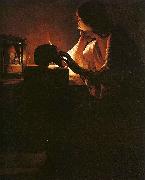Wholesale Oil Painting No Minimum |
|||||||||||
|
|
|||||||||||

|
|||||||||||
|
|
|
||||||||
Georges de La Tour1593-1652 French Georges de La Tour Galleries His early work shows influences from Caravaggio, probably via his Dutch followers, and the genre scenes of cheats??as in The Fortune Teller ??and fighting beggars clearly derive from the Dutch Caravaggisti, and probably also his fellow-Lorrainer, Jacques Bellange. These are believed to date from relatively early in his career. La Tour is best known for the nocturnal light effects which he developed much further than his artistic predecessors had done, and transferred their use in the genre subjects in the paintings of the Dutch Caravaggisti to religious painting in his. Unlike Caravaggio his religious paintings lack dramatic effects. He painted these in a second phase of his style, perhaps beginning in the 1640s, using chiaroscuro, careful geometrical compositions, and very simplified painting of forms. His work moves during his career towards greater simplicity and stillness ?? taking from Caravaggio very different qualities than Jusepe de Ribera and his Tenebrist followers did. He often painted several variations on the same subjects, and his surviving output is relatively small. His son Etienne was his pupil, and distinguishing between their work in versions of La Tour's compositions is difficult. The version of the Education of the Virgin, in the Frick Collection in New York is an example, as the Museum itself admits. Another group of paintings (example left), of great skill but claimed to be different in style to those of de La Tour, have been attributed to an unknown "Hurdy-gurdy Master". All show older male figures (one group in Malibu includes a female), mostly solitary, either beggars or saints. After his death in 1652, La Tour's work was largely forgotten until rediscovered by Hermann Voss, a German scholar, in 1915. In 1935 an exhibition in Paris began the revival in interest among a wider public. In the twentieth century a number of his works were identified once more, and forgers tried to help meet the new demand; many aspects of his œuvre remain controversial among art historians. |
||||||||
|
|
||||||||
The Repentant Magdalen
The Repentant Magdalen Painting ID:: 2359 |
1635
National Gallery of Art, Washington DC 1635 National Gallery of Art, Washington DC |
|||||||
|
|
||||||||
|
El Greco Greek-born Spanish Mannerist Painter, 1541-1614 Considered a representative of late Renaissance Spanish art, El Greco was actually born in Greece, on the island of Crete. After studying in Venice under Titian, El Greco settled in Toledo, Spain in 1577. At the time he was wildly popular, his emotionally religious paintings being just the ticket for the hometown of the Spanish Inquisition. After his death his work was largely ignored until the beginning of the 20th century; now he considered one of the inspired geniuses of Western art. His distinctive style features bold shapes and colors, with elongated and slightly distorted figures. In Toledo El Greco was in constant demand and liked living large: he maintained a private orchestra to accompany his meals. the repentant magdalen mk247 c.1577,oil on canvas,42.5x39.875 in,107.9x101.4 cm,wocester art museum,worcester,ma,usa |
||||||||
|
|
||||||||
|
Prev Next
|
||||||||
|
|
||||||||
|
Related Paintings to El Greco :. |
||||||||
|
|
||||||||
|
CONTACT US |

